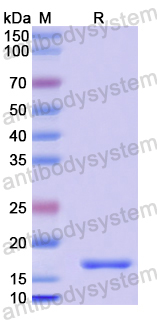Catalog No.
YHK95901
Expression system
E. coli
Species
Homo sapiens (Human)
Protein length
Thr246-Ala371
Predicted molecular weight
16.78 kDa
Nature
Recombinant
Endotoxin level
Please contact with the lab for this information.
Purity
>90% as determined by SDS-PAGE.
Accession
Q9BWT1
Applications
ELISA, Immunogen, SDS-PAGE, WB, Bioactivity testing in progress
Form
Lyophilized
Storage buffer
Lyophilized from a solution in PBS pH 7.4, 0.02% NLS, 1mM EDTA, 4% Trehalose, 1% Mannitol.
Reconstitution
Reconstitute in sterile water for a stock solution. A copy of datasheet will be provided with the products, please refer to it for details.
Shipping
In general, proteins are provided as lyophilized powder/frozen liquid. They are shipped out with dry ice/blue ice unless customers require otherwise.
Stability and Storage
Use a manual defrost freezer and avoid repeated freeze thaw cycles. Store at 2 to 8°C for frequent use. Store at -20 to -80°C for twelve months from the date of receipt.
Alternative Names
CDCA7, JPO1, Cell division cycle-associated protein 7, Protein JPO1
Congenital diseases with defects in DNA methylation maintenance: Focusing on ICF syndrome and multilocus imprinting disturbance., PMID:40500184
The ZBTB24-CDCA7-HELLS axis suppresses the totipotent 2C-like reprogramming by maintaining Dux methylation and repression., PMID:40226918
Mechanistic insights into CDCA gene family-mediated glioblastoma progression: implications for diagnosis, prognosis, and therapeutic targeting., PMID:40114265
In-depth immune profiling of a patient with immunodeficiency, centromeric instability, and facial anomalies syndrome type 2 caused by a novel mutation in ZBTB24., PMID:40103177
CDCA genes as prognostic and therapeutic targets in Colon adenocarcinoma., PMID:39924497
CDCA7 enhances STAT3 transcriptional activity to regulate aerobic glycolysis and promote pancreatic cancer progression and gemcitabine resistance., PMID:39905019
Roles of the CDCA gene family in breast carcinoma., PMID:39814554
ARMH1 is a novel marker associated with poor pediatric AML outcomes that affect the fatty acid synthesis and cell cycle pathways., PMID:39703843
Investigation of Transcription Factor and Cytokine Gene Expression Levels in Helper T Cell Subsets Among Turkish Patients Diagnosed with ICF2 (Novel ZBTB24 gene Variant) and ICF3 (CDCA7 Variant) Syndrome., PMID:39320531
The ICF syndrome protein CDCA7 harbors a unique DNA binding domain that recognizes a CpG dyad in the context of a non-B DNA., PMID:39178265
CDCA7 is an evolutionarily conserved hemimethylated DNA sensor in eukaryotes., PMID:39178260
The C-terminal 4CXXC-type zinc finger domain of CDCA7 recognizes hemimethylated DNA and modulates activities of chromatin remodeling enzyme HELLS., PMID:39142653
Circ_0006220 (circ-TADA2A) accelerates prostate cancer cell malignant behaviors through miR-520f-3p/CDCA7 axis., PMID:39097891
A novel iPSC-based model of ICF syndrome subtype 2 recapitulates the molecular phenotype of ZBTB24 deficiency., PMID:39040103
METTL3-mediated m6A modification of CDCA7 mRNA promotes COAD progression., PMID:38959625
Deficiency of SECTM1 impairs corneal wound healing in aging., PMID:38887148
Exploring the intersection of epigenetics, DNA repair, and immunology from studies of ICF syndrome, an inborn error of immunity., PMID:38799442
CDCA7-associated global aberrant DNA hypomethylation translates to localized, tissue-specific transcriptional responses., PMID:38335290
Integrated bioinformatics analysis and experimental validation identified CDCA families as prognostic biomarkers and sensitive indicators for rapamycin treatment of glioma., PMID:38181024
The ICF syndrome protein CDCA7 harbors a unique DNA-binding domain that recognizes a CpG dyad in the context of a non-B DNA., PMID:38168392
Enhanced CD19 activity in B cells contributes to immunodeficiency in mice deficient in the ICF syndrome gene Zbtb24., PMID:37990035
Coevolution of the CDCA7-HELLS ICF-related nucleosome remodeling complex and DNA methyltransferases., PMID:37769127
The Influence of Race/Ethnicity on the Transcriptomic Landscape of Uterine Fibroids., PMID:37686244
High Expression of CDCA7 in the Prognosis of Glioma and Its Relationship with Ferroptosis and Immunity., PMID:37510310
CDCA7 serves as a novel prognostic marker in human hepatocellular carcinoma., PMID:37248764
Gene dysregulation in acute HIV-1 infection - early transcriptomic analysis reveals the crucial biological functions affected., PMID:37077524
Research into the characteristic molecules significantly affecting liver cancer immunotherapy., PMID:36860864
Identification of key programmed cell death-related genes and immune infiltration in extracorporeal membrane oxygenation treatment for acute myocardial infarction based on bioinformatics analysis., PMID:36531699
CDCA7 promotes TGF-β-induced epithelial-mesenchymal transition via transcriptionally regulating Smad4/Smad7 in ESCC., PMID:36056599
Efp promotes growth of triple-negative breast cancer cells., PMID:35940131
Novel isatin-based hybrids as potential anti-rheumatoid arthritis drug candidates: Synthesis and biological evaluation., PMID:35930922
Investigating CENPW as a Novel Biomarker Correlated With the Development and Poor Prognosis of Breast Carcinoma., PMID:35783290
Regulators CDCA8 as potential targets and biomarkers for the prognosis of human skin cutaneous melanoma., PMID:35575979
Genome-wide association study meta-analysis identifies three novel loci for circulating anti-Müllerian hormone levels in women., PMID:35274129
Downregulation of cell division cycle-associated protein 7 (CDCA7) suppresses cell proliferation, arrests cell cycle of ovarian cancer, and restrains angiogenesis by modulating enhancer of zeste homolog 2 (EZH2) expression., PMID:34551671
CDCA7-regulated inflammatory mechanism through TLR4/NF-κB signaling pathway in stomach adenocarcinoma., PMID:34339079
Multidimensional study of cell division cycle-associated proteins with prognostic value in gastric carcinoma., PMID:34082692
Development and Clinical Validation of a Seven-Gene Prognostic Signature Based on Multiple Machine Learning Algorithms in Kidney Cancer., PMID:33626918
Rare coexistence of three novel CDCA7-ALK, FSIP2-ALK, ALK-ERLEC1 fusions in a lung adenocarcinoma patient who responded to Crizotinib., PMID:33419583
CDCA7 and HELLS suppress DNA:RNA hybrid-associated DNA damage at pericentromeric repeats., PMID:33082427
Genome-wide identification of genes regulating DNA methylation using genetic anchors for causal inference., PMID:32859263
MicroRNA-4331-5p promotes FMDV replication through inhibiting interferon pathways in PK-15 cells., PMID:32574680
High expression of CDCA7 predicts tumor progression and poor prognosis in human colorectal cancer., PMID:32319649
Identification of cancer stem cell-related biomarkers in lung adenocarcinoma by stemness index and weighted correlation network analysis., PMID:32221746
LncRNA LEF1-AS1 silencing diminishes EZH2 expression to delay hepatocellular carcinoma development by impairing CEBPB-interaction with CDCA7., PMID:32178558
The ZBTB24-CDCA7 axis regulates HELLS enrichment at centromeric satellite repeats to facilitate DNA methylation., PMID:31970665
DNA methylation in disease: Immunodeficiency, Centromeric instability, Facial anomalies syndrome., PMID:31724723
CDCA7 promotes lung adenocarcinoma proliferation via regulating the cell cycle., PMID:31570276
Identification of ZBTB24 protein domains and motifs for heterochromatin localization and transcriptional activation., PMID:31561277
Long noncoding RNA FGD5-AS1 promotes colorectal cancer cell proliferation, migration, and invasion through upregulating CDCA7 via sponging miR-302e., PMID:31332696

